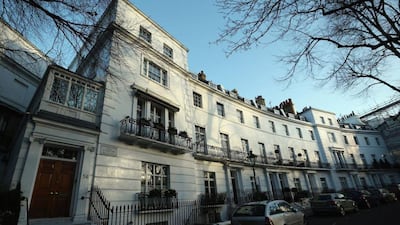More than a fifth of international buyers are "blind purchasing" luxury homes in London, according to real estate agents, as a second wave of coronavirus prevents people from travelling to the UK capital to view properties.
Twenty-two per cent of acquisitions this year were bought by overseas investors that had not viewed the properties themselves, according to property investment firm London Central Portfolio. The company said it was experiencing an influx of overseas buyers willing to buy properties "sight unseen" to ensure they “acquire at bottom of the market pricing”.
Andrew Weir, chief executive of LCP said the anticipated 2-per-cent surcharge on Stamp Duty Land Tax for overseas buyers in April next year, as well as an attractive sterling exchange rate and discounted prices, when compared to the peak of 2016, are the driving forces behind clients trusting the company to negotiate deals on their behalf.
Despite the global pandemic, more money has been spent on £10 million-plus ($12.98m) properties this year in London’s super-prime market than in 2019, according to Knight Frank’s Super-Prime Autumn 2020 Market Insight, published last month.
The company recorded 56 super-prime deals in the first eight months of this year, compared to 57 last year, with a total spend of £1.13 billion in the first eight months of 2020 - 16 per cent higher than the £977.5m recorded in 2019. The property market will continue operating during the second lockdown, which kicks off in the UK on Thursday.
A desire for more outdoor space following the pandemic has boosted demand for suburban and country properties, with houses now preferred over apartments, the real estate firm said. However, buyers are retaining a London investment for the long term.
Meanwhile, rival firm Savills said transactions for London homes with a £5m-plus price tag were 12 per cent higher in the first three quarters of the year than in the same period a year earlier.
While there were 88 deals in this segment in the first three months of the year, this fell back to 43 in the second quarter when lockdown took its toll, followed by 95 sales in the three months ended September 30.
“The international travel restrictions have meant less competition and more opportunity for those on the ground this summer,” said Frances Clacy, a research analyst at Savills. “But the strength of the market this year to date perhaps indicates that activity is beginning to be brought forward to beat the stamp duty surcharge for non-resident buyers which is due to come into effect on April 1 2021."
Prime central London residential values remain around 21 per cent below peak, "and significantly more for those playing the currency card," Ms Clacy added.
Sterling was $1.38 against the dollar at 3.17pm UK time on Tuesday, compared to $1.30 a year ago and $1.52 five years ago, seven months before the Brexit referendum that saw Britain vote to exit the European Union.
Demand for London property has also risen among Middle Eastern buyers, said Knight Frank, due to the UK’s education and legal system.
“Our clients throughout the Middle East continue to favour London as their preferred destination for a second home,” said Henry Faun, partner and head of Private Office, Middle East. “Whether their interest be for a holiday home, children’s education, or investment; both central and outer London are highly sought after. Despite the lockdown, Middle Eastern demand for both houses and apartments in London is resilient”.
The final quarter of the year will be marked by uncertainty, said Tom Bill, head of UK Residential Research at Knight Frank, as the UK government seeks to contain the pandemic amid a second lockdown, Brexit negotiations and the US elections.


